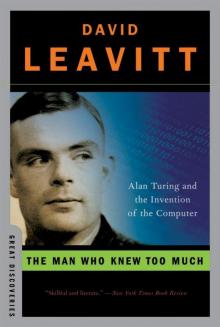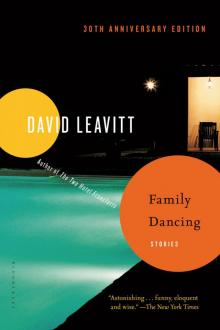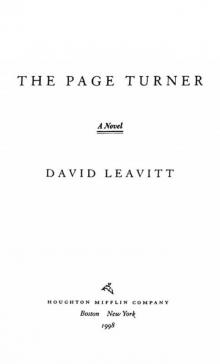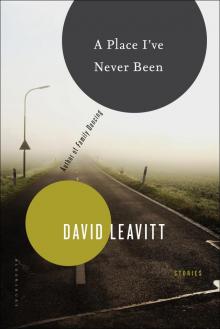- Home
- David Leavitt
Equal Affections Page 2
Equal Affections Read online
Page 2
___________
Danny grew up; he went east. He followed his famous sister, April, all over the country and halted one February in New Haven. He never went back except for visits. And yet, even after he had been in and around New York almost eight years—he was twenty-seven by then, mired with his “life partner,” Walter Bayles, in a morass of shared properties too extensive even to contemplate escaping—he still had trouble, admitting the extent to which that original coast had become his home. Perhaps that was why he refused to trade in his California driver’s license, that same license he’d been issued when he was sixteen, with that same ugly picture of his sixteen-year-old self—wild-grinned, big-nosed—staring out at him. Every four years the renewal arrived, forwarded by his mother. Every four years he thought about exchanging it and didn’t exchange it. It was more than laziness; something in him refused to relinquish that single last link to his birthplace. Too many times a year he still had to zigzag across the continent to see his parents, back and forth, back and forth, until he could no longer tell which coast was his childhood and which his adulthood, which his past and which his future. After a while it was no longer back and forth; he was always traveling back, no matter which direction he was going in, carrying with him the heavy weights of attachment, throwing them down, binding himself to whatever land the plane’s wheels had just touched down on.
There had been a time when the vastness of the country, the splitting of his life between the two coasts had seemed to him a metaphor for his destiny. Visiting his parents, he felt as if he were going back in time. He’d walk the wide avenues of the shopping mall and happen upon his twelve-year-old self, locking his bicycle to a streetlamp, crouched over, his fingers racing to get the combination. His real life—the apartment in New Haven, the nights he spent studying on the old Salvation Army sofa with Walter—seemed to shrink to nothing then, like the town in the musical April had starred in in high school, Brigadoon—a place which, once you slipped out of it, you might never have the chance to return to. But of course years had passed; he had made the journey more times than he could count. It seemed he had surpassed that spirit in himself which craved nothing more than to get out of there, that spirit which had flung him to New Haven, and cold, rainy nights in February, waiting to meet Walter when the law library closed, cold nights when, walking along the stone alleyways of the old stone campus, he breathed with gusto the moldering smell of the borrowed trench coat he was wearing, here, in this region of the world where people wore coats. That part of his youth was over. These days the winter made his bones ache. He kicked and swore at the once-beloved snow. Some days he wanted more than anything to return back west (yes, he had said it; those very words); other days the smell of warm smoke rising from subway grates renewed his old passion, as if the pendulum had ceased swinging in perfect arcs and were instead flying round and round in circles, tying itself in knots.
___________
Danny’s fantasy: He is twelve years old, riding his bicycle to the shopping mall to read soap opera magazines. A sunny Saturday afternoon, the shopping mall quiet, full of women in tennis dresses and plump teenage girls, their stomachs bulging out of stiff jeans, who’ve come here in gangs to smoke. Danny is wearing shorts, a T-shirt emblazoned with the name of the university where his father teaches, tube socks, tennis shoes. His legs are brown from the sun, the hairs on them bleached white. He is locking his bicycle to a lamppost, unscrambling the combination with dirty fingers, when he feels the proximity of another body, feels warm breath against his hair. He turns around, still crouched, and a man is standing over him, a tall man in a gray leather jacket and jeans, a man who is at once a stranger and oddly, intimately familiar to him—but where from? A student of his father’s? A cousin he doesn’t remember? “Excuse me,” the man says, “I’m sorry to bother you, I—” He puts his hands in his pockets, looks away. “Danny,” he says. “Danny.”
Danny’s eyes suddenly fill with tears. His cheeks flush. He looks at the ground.
“I’m you,” the stranger says. “I’m who you’re going to become. And I’ve come to tell you—to reassure you—you’re going to be fine, just fine.”
The boy stands. Of course he sees it now, all of it—that face so familiar because it is his own, but also so strange, because he’s never seen his own face before, not really, except in a mirror, and now he understands how mirrors distort, and where his legs will stretch to, and the awkward unpuzzling of his own face. Tears are welling in his eyes, and in his grown self’s eyes as well, as the man bends down, leans over him, puts a hand on his shoulder. “All the things you’re worried about,” he says, “all the things that make you suffer—they’re nothing. They’re smoke. I know. And I’ve come so you’ll know, so you won’t have to suffer anymore. For you’re going to be fine. You’re going to leave California and head East, just like you hope. And you’ll have love, Danny. I know you can’t believe it now, I know everything you feel. You don’t imagine anyone will ever love you, you can’t conceive how anyone could love you. But someone will. You’ll see.”
The hand on his shoulder—larger, thickly veined, bristled with short brown hairs—is his own hand. Young Danny, crouching still by his bicycle, runs his own fingers over those long fingers, feels the warmth of the skin. One after the other he traces them, until his hand comes to rest on a slender silver ring. Slowly he strokes the ring’s rounded outer edge; slowly he rotates it around the finger on which it’s lodged. Under the ring is a perfect white band where the skin has not been touched by the sun.
Chapter 3
They were Walter’s hands, Danny understood later; man’s hands. Bronze-colored, the skin tough and slightly dry, so that you could see the lines traced as if in white ash. Thick veins tunneling just under the surface of the skin; the nails blunt; a shiny gold Rolex slung low on the wrist, beneath the brilliant white cuff, the black sleeve.
At home Walter took off his shoes and dropped his pants almost as soon as he was in the door. The pants fell heavily and suddenly, the change and keys in his pockets made a crashing noise as they hit the ground. Then for an hour or so he wandered from room to room in black socks, boxer shorts, and suit jacket, seemingly incapable of undressing any further, biting into apples, tearing open bills and throwing the envelopes on the floor. Danny felt a strong impulse to shed the outfits of his working day as soon he was back; before he did anything else he was in a T-shirt and jeans and white socks, he was a boy again. He was usually home earlier than Walter; he didn’t work as hard or as late. So when Walter stumbled through the door, Danny said hello and kissed him, he asked how his day had gone. Their suburban nights stretched out shapelessly, a series of corridors with many turns. They rarely ate formal meals, rarely ate together at all. Walter spooned reheated gourmet frozen dinners from tinfoil containers he had to balance on potholders to keep from getting his fingers burned. He walked as he ate; sometimes he sang. Danny tried to be more healthy. He made tuna melts on seven-grain bread. He vacuumed and cleaned the kitchen and ran the dishwasher. Usually at some point the VCR would switch on, but if it wasn’t pornography they didn’t concentrate; they entered and left, cleaned up or wrote out checks, catching snatches of whatever was on the television, asking each other who characters were, and what had happened to Joan Crawford, and what kind of creep was George Sanders playing now.
Usually by eleven-thirty a tiredness like a drug laid them out flat.
Sometimes the phone rang after midnight. Only one person ever called that late.
“Hi, it’s me.”
“Hi,” Danny said.
“Did I wake you?”
“Well, um, I was in bed—”
“Oh, shit, I always forget—the life of a working stiff. Forgive me, Powderfoot. I live this crazy way, I go to sleep at four and get up at twelve. I forget some people are in bed before midnight.”
“It’s okay, it’s okay—where are you?”
“Northampton. Staying with Ellie and Claire—remember them?”
“I think so—the black woman with the braids and the little blond woman?”
“Yup. The concert just ended half an hour ago. It went pretty well. Well, not exactly a huge audience, but they were enthusiastic. They seemed to like everything we played.”
“So when are you arriving in the Big Apple?”
“A couple weeks, as planned. I hope you don’t mind putting me up again. You don’t, do you, Danny?”
“Of course not.”
“And Walter doesn’t mind?”
“No.”
“Because I could stay with Eileen Herlihy in the East Village or else on this farm in Bucks County. But that’s so far. And Eileen’s apartment is small. And anyway, why would I stay with them when I could visit with my favorite baby brother?”
“April, you know you’re welcome. You’re always welcome.”
“Good. I’m glad.”
“I should be getting to sleep—”
“Oh, sure. Sorry. Forgive me. I’ll hang up. Just wanted to say hi! And that I love you—”
“I love you too—”
Walter shuffled next to him. He didn’t hear any of it; he slept with wax balls in his ears, a black visor pulled over his eyes. But Danny was awake again. He lay back, stretching his arms out, his hands behind his head. It was almost one o’clock.
___________
April was a singer of moderate fame. In the world of women’s music her fame was much more than moderate, and she had made successful crossovers into the worlds of folk music and protest music as well. When they were growing up, she had a nylon-stringed guitar which she taught herself to play, and in the afternoons she sat in her room and practiced chord progressions from the Peter, Paul and Mary songbook. “Something’s wrong,” Nat remarked when he heard her singing. “No white girl is allowed to have a voice like that. Louise, were you fooling around with Nat King Cole behind my back?” In fact, like everyone, he was amazed by the deep voice coming out of April’s slim throat. She was sixteen and Danny was seven, and she had taught him the harmony for “Leaving on a Jet Plane.” While she played guitar, they sang together, and Nat, by the third chorus, had tears in his eyes. It meant a lot to him, so much that even years later, when they were home for Christmas, he still bugged them to sing “Leaving on a Jet Plane” for him. “Come on,” he’d say, “you remember. Leavin’ on that jet plane, don’t know when I’ll be back again?” “Oh, Dad,” April would answer, tossing back her hair, laughing, “you’re still tone-deaf.” And though Danny was by that time completely tone-deaf as well, and April—well, April was famous; April was a star—they would sit down together and sing it, all the way to the end, April strumming her old nylon-stringed guitar as inexpertly as she had when she was sixteen. Nat hummed along as best he could, and smiled, transported by the music to some region of nostalgia probably reserved for fathers of grown children. Danny, on the other hand, had no room in himself for nostalgia, at least where April was concerned.
He had lived through much of her fame, in both senses. He had gone along for the ride. For two years he had watched as doors were opened to her, and loaves of seven-grain bread baked for her, and lovers procured for her in towns all over America. Most often they were smaller towns—Iowa City and Northampton and New Haven—places where rents were cheap and universities predominant; places where, in earnest, women who love other women had been for years collecting.
Danny met Walter in 1980, in a New Haven women’s bar called Isadora’s. They were the only two men in the bar, and both of them were tall, which was probably why they sought out each other’s eyes above that crowded landscape of dancers, and why they smiled. Walter, who was at the time in his second year at Yale Law School, was in the company of seven women graduate students whose lesbianism, where not proclaimed, was at least incipient. They had invited him to come with them to the bar after April’s concert, he told Danny later, while they lay huddled together in his twin bed, under blankets washed by his mother, and he had agreed to go on a lark; he’d never been to a lesbian bar before, and he wanted to see what one was like. And why had he gone to the concert? Danny asked. Well, Walter said, it wasn’t because he was interested in women’s music per se, but because he was a fan of April’s earlier albums, her protest songs, which his older sister had liked to play when he was a teenager in the seventies. “This new stuff,” he said, “it’s okay. But it doesn’t have the power, for me, of her early songs—‘No More Vietnams,’ say, or ‘Gathering in the Fields.’ I wish she’d played those. The new songs—oh, I don’t know. Maybe because I’m not a woman, I can’t understand them.”
Of course, inevitably, he asked what Danny was doing at the concert, and Danny had to explain that he was April’s brother as well as the assistant tour manager. “But I didn’t see your name on the program,” Walter said, after several minutes of bafflement and insistence that Danny was joking. “It was all women’s names.”
“Well,” Danny said, “that’s true,” and explained that because it had been just a year since the release of April’s landmark album, Discovery, there was a wariness among the women who worked on the tour, a feeling that the concerts had to be projects conceived by and for women alone. The inclusion of a man’s name on an album cover or concert program, it had been decided, might be misperceived as a gesture toward patriarchy, putting or scaring off some women. Indeed, it was only because April was women’s music that year that in the end he had been allowed to come along at all. She needed him. He was renamed, on the program, Danielle Powderfoot. (A joke of April’s; someone had complained that Native American women were underrepresented.)
For two months that year they zigzagged across the country in a rackety Volkswagen bus: Danny, April, her three-woman band, Vickie, the stage manager, and Jennifer Cavanaugh, the sign language interpreter. They never stayed in motels, less for financial than for political reasons. Women all over the country welcomed them into their houses and fed them potluck suppers, after which they would lead them on tours of their cooperative printshops. In New Haven they were to have been given accommodation at a communal women’s household on Eld Street. At least that had been the plan, until the heads of the household laid their eyes on Danny. “He can’t stay here,” remarked a woman with a beaky nose who appeared to be in a position of some authority. “I’m sorry, that’s just the way it is.”
“But wait,” April said. “He’s my brother, and anyway, he’s gay.”
They called a house meeting to decide the matter. April and Danny and the band waited in a kind of anteroom, Danny looking into his lap and trying to ignore the stares of Vickie, the stage manager—she was the most feminist of the bunch and had disapproved of his involvement from the start. He knew that somewhere across the house those serious, stern-faced women were debating. Things never came to a vote with them; they believed in consensus, which as far as Danny could tell meant arguing until one or another side got tired and gave up.
“Cheer up,” Lourene, the drummer, said to comfort him, and handed Danny a piece of Bazooka bubble gum, which she was never without.
In the end the women decided that Danny could stay one night, but that after that he should try to find some other accommodations for the rest of the three-day layover.
“And I’ll bet you were just hoping,” Walter said, in that little narrow bed in the law students’ dorm, “that you’d find a nice Yale boy with a room to share.”
“I admit it,” Danny said, and smiled. He was nineteen; April was twenty-eight. Up until that night he had thought he would never love anyone as much as he loved her. When she sang, he was rendered speechless with pride and pleasure and, being tone-deaf like his father, jealousy. He could not sing a note, would never be able to, and since he believed (as April believed) that there was nothing more noble or good in the world than song, no medium more powerful or lucid, he had decided that there was no reason he shouldn’t be content to be April’s flunky, her gofer, devoting his life to her work. As for April, she took Danny’s devotio
n for granted. She was at her peak then—a brief span of years, as it turned out, when she could call herself a star.
Women all over the country worshiped her. In the Volkswagen bus she liked to read aloud the letters and poems they sent her. “Dear April: I’ll bet you get a hundred letters like this, and are wondering why you should pay any attention to mine when there are so many, but I just want to say your record Discovery changed my life and that I love you and long to meet you someday. Sincerely, Jane Carmichael.”

 Shelter in Place
Shelter in Place The Man Who Knew Too Much: Alan Turing and the Invention of the Computer (Great Discoveries)
The Man Who Knew Too Much: Alan Turing and the Invention of the Computer (Great Discoveries) Family Dancing
Family Dancing Page Turner Pa
Page Turner Pa The Lost Language of Cranes: A Novel
The Lost Language of Cranes: A Novel The Body of Jonah Boyd
The Body of Jonah Boyd The Marble Quilt
The Marble Quilt In Maremma
In Maremma While England Sleeps
While England Sleeps A Place I've Never Been
A Place I've Never Been The Two Hotel Francforts
The Two Hotel Francforts The Indian Clerk
The Indian Clerk Florence
Florence Martin Bauman
Martin Bauman Equal Affections
Equal Affections The Lost Language of Cranes
The Lost Language of Cranes Arkansas
Arkansas